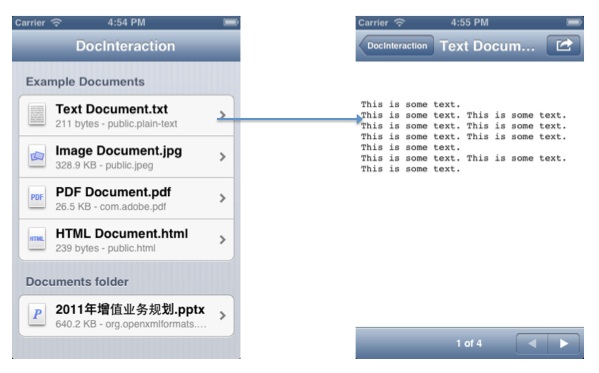IOS提供了对各种文档(PDF, PPT, word, txt, jpg等)的浏览功能,这个非常使用,因为我们难免需要app里浏览各种文档。官方的Sample code DocInteraction展示了如何在IOS浏览各种格式的文档。
本Sample非常简单,在tableview里列出了预定的和制定目录下的文档列表,点击某个文档时,能切换view并预览文档内容:

从这个sample里能学到的关键点是:
从文件目录中载入文件列表 监控文档目录中文件的变动,并实时反馈在UI上 预览各种文档内容从文件目录中载入文件列表
IOS提供了NSFileManager来访问文件系统,从以下代码能很清晰地了解到如何通过NSFileManager查询某个目录路径下所有所有文件:
- (void)directoryDidChange:(DirectoryWatcher *)folderWatcher
{
[self.documentURLs removeAllObjects]; // clear out the old docs and start over
NSString *documentsDirectoryPath = [self applicationDocumentsDirectory];
NSArray *documentsDirectoryContents = [[NSFileManager defaultManager] contentsOfDirectoryAtPath:documentsDirectoryPath error:NULL];
for (NSString* curFileName in [documentsDirectoryContents objectEnumerator])
{
NSString *filePath = [documentsDirectoryPath stringByAppendingPathComponent:curFileName];
NSURL *fileURL = [NSURL fileURLWithPath:filePath];
BOOL isDirectory;
[[NSFileManager defaultManager] fileExistsAtPath:filePath isDirectory:&isDirectory];
// proceed to add the document URL to our list (ignore the "Inbox" folder)
if (!(isDirectory && [curFileName isEqualToString: @"Inbox"]))
{
[self.documentURLs addObject:fileURL];
}
}
[self.tableView reloadData];
}在UI上展现文件列表就是通过tableView的datasource来完成,在上一节的分享中已分析此部分,此时只需reloadData刷新一下即可。
监控文档目录中文件的变动,并实时反馈在UI上
对文件目录的监控本例子是借助系统内核函数来完成,先看代码:
- (BOOL)startMonitoringDirectory:(NSString *)dirPath
{
// Double initializing is not going to work...
if ((dirKQRef == NULL) && (dirFD == -1) && (kq == -1))
{
// Open the directory we're going to watch
dirFD = open([dirPath fileSystemRepresentation], O_EVTONLY);
if (dirFD >= 0)
{
// Create a kqueue for our event messages...
kq = kqueue();
if (kq >= 0)
{
struct kevent eventToAdd;
eventToAdd.ident = dirFD;
eventToAdd.filter = EVFILT_VNODE;
eventToAdd.flags = EV_ADD | EV_CLEAR;
eventToAdd.fflags = NOTE_WRITE;
eventToAdd.data = 0;
eventToAdd.udata = NULL;
int errNum = kevent(kq, &eventToAdd, 1, NULL, 0, NULL);
if (errNum == 0)
{
CFFileDescriptorContext context = { 0, self, NULL, NULL, NULL };
CFRunLoopSourceRef rls;
// Passing true in the third argument so CFFileDescriptorInvalidate will close kq.
dirKQRef = CFFileDescriptorCreate(NULL, kq, true, KQCallback, &context);
if (dirKQRef != NULL)
{
rls = CFFileDescriptorCreateRunLoopSource(NULL, dirKQRef, 0);
if (rls != NULL)
{
CFRunLoopAddSource(CFRunLoopGetCurrent(), rls, kCFRunLoopDefaultMode);
CFRelease(rls);
CFFileDescriptorEnableCallBacks(dirKQRef, kCFFileDescriptorReadCallBack);
// If everything worked, return early and bypass shutting things down
return YES;
}
// Couldn't create a runloop source, invalidate and release the CFFileDescriptorRef
CFFileDescriptorInvalidate(dirKQRef);
CFRelease(dirKQRef);
dirKQRef = NULL;
}
}
// kq is active, but something failed, close the handle...
close(kq);
kq = -1;
}
// file handle is open, but something failed, close the handle...
close(dirFD);
dirFD = -1;
}
}
return NO;
}
这段代码基本上都是对内核c函数的使用,虽然有些晦涩,但流程还是很简单的,首先是对系统事件的监控,然后基于IOS的thread框架来callback文件目录变动后的回调,回调的具体内容实现在KQCallback中,此方法也非常简单,实际上就是基于Delegate模式调用到上一段的directoryDidChange方法,继而刷新tableview的内容。具体的c函数的用法这里就不多说,但值得我们学习的是如何在IOS的层面上调用底层BSD系统API。
预览各种文档内容
本例子中最核心的点反而是最简单的,IOS提供了QLPreviewController,通过此controller能直接得到预览各种文档的view,你只需要把view塞到navigationController中即可,代码如下:
- (void)tableView:(UITableView *)tableView didSelectRowAtIndexPath:(NSIndexPath *)indexPath
{
NSURL *fileURL;
if (indexPath.section == 0)
{
fileURL = [NSURL fileURLWithPath:[[NSBundle mainBundle] pathForResource:documents[indexPath.row] ofType:nil]];
}
else
{
fileURL = [self.documentURLs objectAtIndex:indexPath.row];
}
[self setupDocumentControllerWithURL:fileURL];
[self.docInteractionController presentPreviewAnimated:YES];
QLPreviewController *previewController = [[QLPreviewController alloc] init];
previewController.dataSource = self;
previewController.delegate = self;
// start previewing the document at the current section index
previewController.currentPreviewItemIndex = indexPath.row;
[[self navigationController] pushViewController:previewController animated:YES];
[previewController release];
}具体如何设定预览的内容和行为,是在QLPreviewControllerDelegate和QLPreviewControllerDataSource中完成的,所以这里只需要在controller中实现QLPreviewControllerDelegate和QLPreviewControllerDataSource相关方法即可:
// Returns the number of items that the preview controller should preview
- (NSInteger)numberOfPreviewItemsInPreviewController:(QLPreviewController *)previewController
{
NSInteger numToPreview = 0;
NSIndexPath *selectedIndexPath = [self.tableView indexPathForSelectedRow];
if (selectedIndexPath.section == 0)
numToPreview = NUM_DOCS;
else
numToPreview = self.documentURLs.count;
return numToPreview;
}
// returns the item that the preview controller should preview
- (id)previewController:(QLPreviewController *)previewController previewItemAtIndex:(NSInteger)idx
{
NSURL *fileURL = nil;
NSIndexPath *selectedIndexPath = [self.tableView indexPathForSelectedRow];
if (selectedIndexPath.section == 0)
{
fileURL = [NSURL fileURLWithPath:[[NSBundle mainBundle] pathForResource:documents[idx] ofType:nil]];
}
else
{
fileURL = [self.documentURLs objectAtIndex:idx];
}
return fileURL;
}
第一个方法是设定一组文档浏览的个数,会影响到在文档预览中的上/下一页,第二个方法是指定文档预览的文件路径,由此可见在IOS中预览各种文档是件很简单的事儿,并且可预览的格式非常广,只要在mac的预览能支持的,这里都能支持,简单测试后发现基本能支持所有常规文档。 |
 /2
/2 